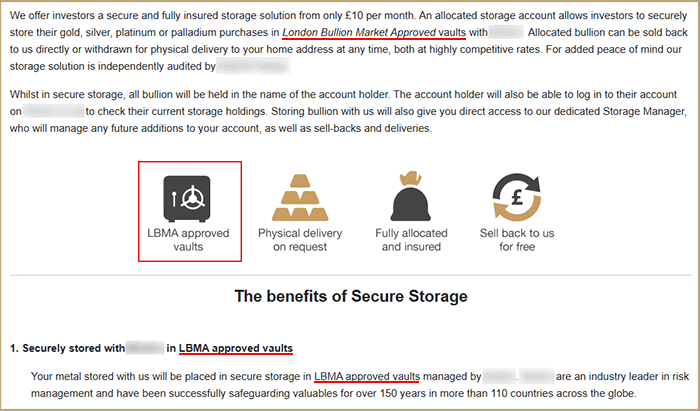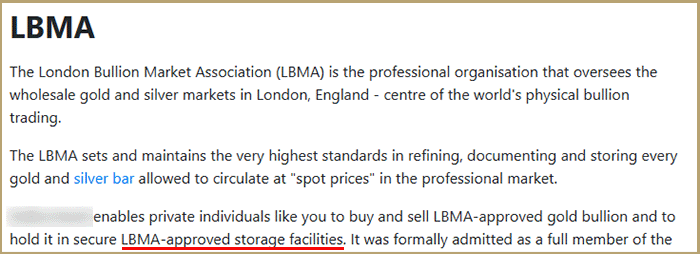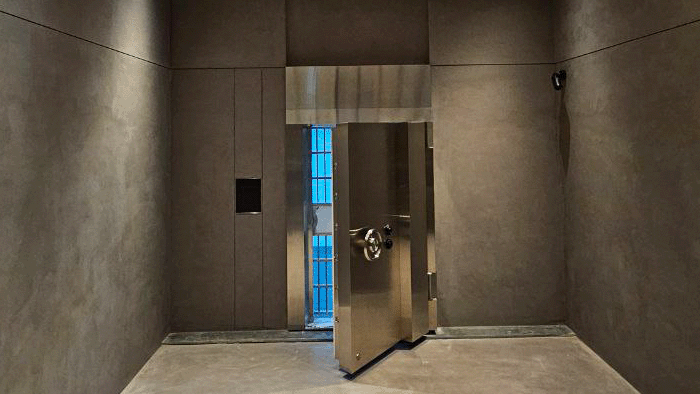The Myth of LBMA-Approved Vaults
13 December 2024

In our interactions with clients over the years, the term “LBMA-approved vaults” has been mentioned occasionally, implying a level of endorsement from the London Bullion Market Association (LBMA). Apparently, the websites or market materials of some precious metal companies claim the existence of LBMA-accredited or approved vaults. However, such claims are misleading and perpetuate a common myth in the bullion industry.
Examples of “LBMA-Approved Vault” Claims
A quick check on the Internet shows several websites that mention the option of storing client precious metals in “LBMA-approved vaults.”
For instance, below is text from three websites of companies offering precious metal storage in LBMA-approved vaults.



So, what is an LBMA-approved vault, and does it even exist? Let us find out from the LBMA itself.
What Does the LBMA Say About LBMA-Approved or Accredited Vaults?
A quick check on the LBMA’s website shows that they explicitly state that they do not approve physical vaults, which the market may use on different web pages.
Under the LBMA’s Rules and Governance page, it states:
“It should be noted that LBMA does not approve physical Vaults which may be used by the market.”
This section further lists several banks that are LBMA clearing members and the secure logistics companies, also LBMA members, that the banks use to vault gold traded daily in London.
The LBMA further states:
“Inclusion in this list does not constitute or imply any representation or warranty by LBMA as to creditworthiness or as to the services or goods supplied or quality or compliance with any specification relating thereto. No liability for direct or consequential loss, howsoever caused, whether by negligence or otherwise, whether by use of this list or reliance thereon, is accepted by LBMA.”
The LBMA’s Vaulting page again emphasizes that there is no such thing as an LBMA-accredited or approved vault.
The page states:
“Although LBMA does not approve or accredit new vaults, we have compiled best practice guidelines for new vaults – as well as for the safe packing, transportation and storage of gold and silver bars.”
In another page on its website, the Clearing Statistics FAQ, the LBMA reiterates that:
“The LBMA does not accredit institutions to provide vaulting services to the London bullion market.”
Although the next sentence says that “the London Precious Metal Clearing Limited (LPMCL) provides formal recognition of companies to provide vaulting services,” seemingly suggesting some form of endorsement by the LPMCL, the answer to the last question clearly states:
“Below is a list of vaulting companies which are acceptable to individual LPMCL Members. This summary is not intended to imply that LPMCL has approved such vaults.”
In the Annex A: Approved Weighers of Gold and Silver Bars page, the LBMA states once again that:
“It should be noted that LBMA does not approve Vaults and that inclusion in the Approved Weighers List relates solely to the weighing by the entities listed of gold and silver Bars according to the standards laid down by LBMA.”
Finally, on another page, the Best Practice Guidelines meant for “Loco London” vaults, the LBMA writes:
“Please note these are for guidance only. Adherence to these guidelines DOES NOT guarantee acceptance as a vault for London Clearing. It should be noted that neither LBMA nor LPMCL ‘approve’ or ‘authorise’ vaults. Vaults are approved for use on a bi-lateral basis only, between the customer (e.g. LPMCL member) and the vault.”
It should be abundantly clear that the LBMA does not accredit or approve vaults. Even if there are mentions of approved vaults in other places of the LBMA website, the context is strictly for “Loco London” vaults.
The term Loco London refers to gold and silver bullion that is physically held in London vaults to support London’s gold-trading activity. Therefore, no vault outside London should even claim to be LBMA-approved.
Moreover, any relation between LBMA and vault storage facilities is strictly limited to institutional trading activity on London’s gold market, which clears over 20 million ounces of gold and more than 200 million ounces of silver on a net basis daily. It has no bearing on gold storage by retail investors.
What Does the LBMA Approve or Accredit?
If the London Bullion Market Association does not approve vaulting facilities, what does it approve or accredit? As an international trade association that governs strict standards and quality assurance for the global precious metals market, the LBMA accredits weighers, refiners, referees and service providers to fulfil its mission.
LBMA Approved Weighers
The LBMA Approved Weigher list plays an important role in maintaining the integrity, accuracy, and trustworthiness of the global precious metals market. These weighers verify the weight of Good Delivery gold and silver bars, used as a benchmark for trade in the London bullion market and beyond.
Given the high value of these bars, even minute discrepancies in weight measurements could result in significant financial losses, disputes, or mistrust. To avoid these risks, the LBMA accredits weighers who adhere to its stringent standards for precision, reliability, and professionalism.
In the event of a weighing dispute, the LBMA will designate an independent Approved Weigher, unconnected to the dispute, to serve as an umpire and provide a non-binding opinion on which party is accountable for the weight discrepancy.
Before a company can become an LBMA-approved weigher, it must pass a competency assessment to check the weights of new gold bars entering London.
LBMA Accredited Refiners
LBMA-accredited refiners, also known as Good Delivery refiners, ensure the consistent quality, purity, and reliability of bullion bars that serve as the benchmark for international markets.
Gold and silver refiners are required to produce gold and silver bars that meet the LBMA’s Good Delivery standards and are acceptable in settling a Loco London contract. Bars on the London market are traded directly between two parties, without the involvement of an exchange, requiring bars to have exact specifications of approximately 400 troy ounces for gold and 1,000 troy ounces for silver.
The rigorous accreditation criteria, including the refiner’s history in the market, financial standing (including having a tangible net-worth of at least £15 million pounds), technical proficiency in meeting LBMA standards, and production capacity (at least 10 tons of refined gold and 50 tons of refined silver annually), safeguard the integrity of the Good Delivery List, which is recognized worldwide as a mark of excellence in the precious metals industry.
Accredited refiners must implement LBMA’s Responsible Gold and/or Responsible Silver Guidance. They further commit to adhering to LBMA’s Responsible Sourcing Program and shipping gold and silver bars to designated London vaults.
The LBMA goes to great lengths to set these standards to ensure the long-term viability of accredited refiners.
LBMA Appointed Referees
In maintaining the Good Delivery System, the LBMA appoints referees to ensure that only gold and silver bars meeting Good Delivery standards are used to settle Loco London contracts.
Only refiners listed on the Good Delivery List for both gold and silver, with long refining histories, and who were LBMA Members were invited to apply as LBMA Referees.
Referees are an integral part of the LBMA’s proactive monitoring process, which reviews Good Delivery refiners’ assaying competence on a three-yearly basis. They check samples of refiners’ supervised tests—a dip sampling process from a normal melt.
Furthermore, LBMA Referees also provide technical assessments of Good Delivery applicants and technical advice on a range of topics, including amendments to Good Delivery Rules, legal issues arising from fake bars, and responsible gold matters.
The current LBMA Referees are Argor-Heraeus SA, Metalor Technologies SA, MKS PAMP SA, Rand Refinery (PTY) Ltd, and Tanaka Kikinzoku Kogyo.
LBMA Approved Service Providers
The LBMA Responsible Sourcing Program is a cornerstone of the London Bullion Market Association's efforts to ensure that gold and silver traded within its network are ethically and sustainably sourced.
It establishes rigorous standards for LBMA-accredited refiners, mandating comprehensive due diligence across the supply chain. These standards require refiners to identify and mitigate risks associated with conflict financing, human rights abuses, environmental harm, and money laundering.
To enforce compliance, the LBMA mandates independent third-party audits by Approved Service Providers, also known as Assurance Providers. These audits are based on the ISAE 3000 Standard and scrutinize refiners' sourcing activities and supply chain transparency, ensuring adherence to the LBMA's standards.
Assurance Providers undergo a stringent accreditation process, which includes providing details of their relevant experience, skills, and quality control and governance processes.
By maintaining stringent oversight, the LBMA Responsible Sourcing Program safeguards the integrity of the bullion market, fosters trust among stakeholders, and contributes to the broader goal of sustainable and ethical trade practices worldwide.
How to Choose a Precious Metals Vault for Storage
If there is no such entity as an LBMA-approved vault, how else can you choose the best gold or silver vault for bullion storage?
Storing precious metals need not be a complicated matter. Our advice is to reason from the basic principles of trust. For example, asking oneself:
- Do I have reasons to trust the vault operator? What is the management team’s background and the company’s track record?
- How can I be certain that I am the legal title owner of my stored bullion?
- How can I be sure that my bullion exists?
- How can I be certain that my bullion is genuine?
- What protection does the vault’s insurance policy offer, and what events does it not cover?
- How much jurisdictional exposure do I have to governmental gold confiscation events?
These are the essential questions you should ask while assessing whether a vault is suitable for storing your precious metals assets, instead of accepting the ambiguous claims that a vault is LBMA-approved.
The Safe House Vault: Designed for Systemic Wealth Protection
Since The Safe House’s inception in 2014, we have observed an increasing number of clients buying physical gold and silver for wealth protection (as opposed to speculation or investment).
It is obvious that the well-informed are turning to precious metals as a safe haven to safeguard their purchasing power and protect against the continued currency debasement caused by modern central banking monetary policies.
While protecting one’s wealth with physical silver and gold bullion is wise, mitigating against potential governmental gold confiscation risks is even wiser. History has shown that the chances of gold expropriation or confiscation arise when confidence in currencies is low, requiring desperate action from governments to rebuild that trust.
Demonstrating a country's sufficient gold reserves has often been the best way to regain the confidence of citizens and foreign investors. Therefore, insufficient gold reserves are a big problem, creating the motive for gold confiscation from residents.
Beyond buying bullion to protect wealth, it is equally important to store your assets in the safest jurisdiction, where the risks of gold confiscation are minimized.

The Safe House vault is designed for systemic wealth protection. While conventional vaults may extol the benefits of storing precious metals in multiple countries worldwide, we believe local jurisdiction supersedes global jurisdiction.
This is why The Safe House is exclusively located in Singapore, one of the safest countries in the world. We follow only Singapore law and are not obliged to obey any foreign government requests outside the Singapore legal system.
Singapore is also one of the most prosperous countries in the world. Its open economy welcomes foreign investments and allows capital flow. This makes it easy to transfer funds into Singapore to buy and store precious metals and to receive funds when you sell.
Your precious metal assets stored at The Safe House are uniquely identifiable (using parcel numbers), allowing legal ownership of specific assets. These unique parcel numbers are recorded in statement documents you will receive as a storage client.
Unlike conventional vaults that store assets on a “said-to-contain” basis, we store your precious metal assets on a “known good” basis. We can do this because The Safe House vault has its precious metal testing laboratory, ensuring that all stored bullion is genuine.
Finally, The Safe House has one of the most comprehensive insurance policies in the bullion storage industry. It covers more risks than standard “All-Risk” insurance policies, having coverage even against mysterious disappearances.
To better appreciate the unique protections offered by The Safe House, please read our article “How to Choose the Best Gold and Silver Vault for Offshore Storage,” which will also help you assess the best precious metal vaults to store with.